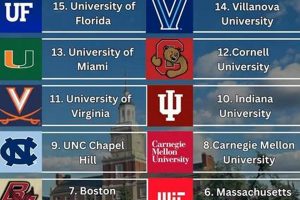Top-tier institutions offering acupuncture education within the United States provide comprehensive training in traditional Chinese medicine theory, acupuncture techniques, and related modalities. This education typically includes significant clinical experience, preparing graduates for licensure and practice. Examples of program components include point location, needle manipulation, herbal medicine, and treatment strategies for various health conditions.
High-quality acupuncture programs are essential for producing competent and ethical practitioners. Rigorous training ensures patient safety and efficacy of treatment. Historically, the development of acupuncture education in the US has reflected a growing acceptance of integrative medicine and a demand for qualified practitioners. Graduates of these institutions play a crucial role in providing accessible and effective healthcare options.
The following sections will delve deeper into factors to consider when choosing an acupuncture school, prominent institutions known for excellence in this field, licensure requirements, and career opportunities for graduates.
Tips for Selecting an Acupuncture Program
Choosing the right acupuncture program is a crucial step toward a successful career in this field. Careful consideration of several factors can ensure alignment with individual career goals and educational needs.
Tip 1: Accreditation Matters: Seek programs accredited by the Accreditation Commission for Acupuncture and Oriental Medicine (ACAOM). ACAOM accreditation signifies adherence to rigorous educational standards and facilitates licensure in many states.
Tip 2: Faculty Expertise: Investigate the faculty’s credentials, experience, and areas of specialization. A diverse and accomplished faculty can enrich the learning experience.
Tip 3: Clinical Training Opportunities: Robust clinical training is essential. Evaluate the program’s clinical facilities, patient volume, and the variety of conditions encountered during internships.
Tip 4: Curriculum Breadth: Examine the curriculum for comprehensive coverage of acupuncture theory, techniques, herbal medicine, and related modalities. A well-rounded curriculum prepares graduates for diverse practice settings.
Tip 5: Location and Learning Environment: Consider the program’s location and its impact on lifestyle and access to resources. A supportive and stimulating learning environment is conducive to academic success.
Tip 6: Program Length and Cost: Acupuncture programs vary in length and cost. Evaluate these factors in relation to personal circumstances and financial resources.
Tip 7: Career Support Services: Inquire about career guidance, networking opportunities, and alumni connections offered by the program. These resources can assist graduates in their job search and professional development.
By carefully considering these factors, prospective students can identify programs that align with their individual needs and aspirations, setting the stage for a rewarding career in acupuncture.
The insights provided in this section aim to equip prospective students with the knowledge necessary to make informed decisions. The concluding section will summarize key takeaways and offer final recommendations.
1. Accreditation
Accreditation plays a vital role in identifying high-quality acupuncture programs. It serves as an indicator of a program’s adherence to established educational standards, ensuring rigorous training and competency among graduates. For prospective students seeking the best acupuncture education, accreditation is a crucial factor to consider.
- Institutional Accreditation:
Institutional accreditation, granted by agencies recognized by the US Department of Education, signifies that an institution as a whole meets specific quality standards. This type of accreditation provides a broad overview of the institution’s educational integrity and operational effectiveness. In the context of acupuncture schools, institutional accreditation provides a foundational level of quality assurance.
- Programmatic Accreditation:
Programmatic accreditation, specifically for acupuncture programs, is granted by specialized agencies such as the Accreditation Commission for Acupuncture and Oriental Medicine (ACAOM). ACAOM accreditation signifies that a program meets stringent standards specific to acupuncture education, including curriculum content, faculty qualifications, and clinical training. It is a key indicator of a program’s commitment to providing high-quality education in acupuncture and Oriental medicine. Graduates of ACAOM-accredited programs often have an advantage in licensure and employment opportunities.
- Regional vs. National Accreditation:
Understanding the distinction between regional and national accreditation is important. Regional accreditation is typically considered the more prestigious form and is often required for transferring credits between institutions. National accreditation may be more common among vocational or specialized schools. When considering acupuncture programs, prioritize those with regional or specialized programmatic accreditation like ACAOM.
- Impact on Licensure and Career Opportunities:
Accreditation directly impacts a graduate’s ability to obtain licensure and pursue career opportunities. Many states require graduation from an ACAOM-accredited program as a prerequisite for licensure. Employers often prefer candidates who have graduated from accredited programs, recognizing the value of a standardized and high-quality education. Therefore, attending an accredited program significantly enhances career prospects within the field of acupuncture.
Accreditation, whether institutional or programmatic, serves as a critical marker of quality in acupuncture education. By prioritizing accredited programs, prospective students can invest in their education with confidence, knowing they are receiving training that meets recognized standards and enhances their career opportunities. This focus on accreditation ultimately contributes to the advancement of the profession and ensures competent and ethical practice for the benefit of patients.
2. Faculty Expertise
Faculty expertise stands as a cornerstone of high-quality acupuncture education. Distinguished faculty members contribute significantly to the learning environment, shaping the next generation of acupuncturists. The depth and breadth of their knowledge, combined with practical experience, directly impacts the quality of education students receive and influences their future career trajectories. An examination of key facets of faculty expertise provides insight into its crucial role in leading acupuncture programs.
- Academic Credentials and Professional Recognition:
Doctoral degrees in acupuncture and Oriental medicine, alongside licensure and board certification, signify a faculty member’s commitment to advanced training and adherence to professional standards. Membership in professional organizations, such as the American Association of Acupuncture and Oriental Medicine (AAAOM), demonstrates active engagement within the field and a commitment to ongoing professional development. These qualifications enhance the credibility of the program and contribute to a rigorous learning environment.
- Diversity of Specialization:
A faculty comprising specialists in various areas within acupuncture and Oriental medicine enriches the educational experience. Expertise in areas such as pain management, women’s health, or sports medicine allows students to explore diverse treatment approaches and develop specialized skills. Exposure to a range of specialties prepares graduates for broader career opportunities and the ability to address diverse patient needs.
- Clinical Experience and Integration of Practice:
Faculty members with extensive clinical experience bring practical insights into the classroom, bridging the gap between theory and practice. Instructors actively involved in clinical practice provide real-world examples, case studies, and up-to-date treatment protocols, enhancing the relevance of the curriculum. This integration of theory and practice prepares students for the demands of clinical settings and fosters competent patient care.
- Scholarly Contributions and Research Engagement:
Faculty involvement in research contributes to the advancement of the field and exposes students to the latest developments in acupuncture and Oriental medicine. Published research, presentations at conferences, and involvement in clinical trials demonstrate a commitment to expanding the knowledge base of the discipline. This emphasis on research fosters a culture of inquiry and prepares students to engage with evidence-based practice.
The collective expertise of the faculty directly influences the quality of education and ultimately shapes the future of the acupuncture profession. Leading acupuncture schools prioritize faculty expertise, recognizing its essential role in fostering competent, ethical, and successful practitioners. This commitment to excellence in faculty composition distinguishes top-tier programs and contributes to the overall advancement of the field of acupuncture and Oriental medicine.
3. Clinical Training
Clinical training forms an indispensable component of top-tier acupuncture programs in the United States. A robust clinical experience bridges theoretical knowledge with practical application, essential for developing competent and confident practitioners. The extent and quality of clinical training directly correlate with a program’s ability to produce graduates prepared for the complexities of professional practice. This connection hinges on several key factors.
Effective clinical training provides students with opportunities to develop essential skills under the supervision of experienced practitioners. These skills encompass patient intake, diagnosis, treatment planning, needle insertion techniques, and the management of diverse patient populations. For example, a student might gain experience treating patients with pain conditions, neurological disorders, or women’s health issues within a supervised clinical setting. This practical experience fosters proficiency in core acupuncture techniques and cultivates critical thinking skills essential for adapting treatment strategies to individual patient needs. Furthermore, exposure to a diverse patient population within the clinical setting prepares graduates for the realities of private practice and community clinic environments.
High-quality clinical experiences often involve partnerships with community clinics, hospitals, and integrative health centers. Such partnerships broaden the scope of clinical exposure, enabling students to interact with diverse patient populations and healthcare professionals. These collaborative experiences foster interprofessional communication skills, crucial for effective teamwork within integrated healthcare settings. The integration of clinical training with real-world healthcare environments strengthens a program’s reputation and enhances graduates’ employability. The ability to effectively communicate and collaborate with other healthcare professionals contributes significantly to successful patient outcomes and elevates the standard of care provided.
In summary, robust clinical training serves as a defining characteristic of leading acupuncture programs. The integration of theoretical knowledge with practical experience, facilitated by diverse clinical opportunities and collaborative partnerships, produces graduates equipped to provide safe, effective, and patient-centered care. This emphasis on clinical training underscores the commitment of these institutions to excellence in acupuncture education and contributes significantly to the advancement of the profession as a whole. Challenges remain in ensuring equitable access to high-quality clinical experiences for all students, and ongoing efforts to expand and refine clinical training models are crucial for the continued growth and development of the field.
4. Comprehensive Curriculum
A comprehensive curriculum distinguishes top acupuncture schools, providing students with a robust foundation in traditional Chinese medicine principles and their practical application. This breadth of knowledge equips graduates to address diverse patient needs and adapt to evolving healthcare landscapes. The curriculum’s scope directly correlates with the quality of education and preparedness of graduates entering professional practice. Several key facets illustrate the components and implications of a comprehensive acupuncture curriculum.
- Foundational Theory of Traditional Chinese Medicine (TCM):
A strong theoretical foundation in TCM principles, including yin-yang theory, Five Element theory, and meridian systems, is crucial. This theoretical framework informs diagnostic and treatment strategies. For example, understanding the Five Element relationships allows practitioners to address underlying imbalances contributing to a patient’s condition, rather than simply treating symptoms. This holistic approach is a hallmark of TCM and distinguishes it from other healthcare modalities.
- Diverse Acupuncture Techniques:
Mastery of various needling techniques, such as body acupuncture, auricular acupuncture, electroacupuncture, and moxibustion, expands treatment options and allows for individualized patient care. For instance, electroacupuncture may be particularly effective for pain management, while moxibustion can address conditions arising from cold or deficiency. A curriculum encompassing diverse techniques prepares graduates to adapt their approach based on patient presentation and treatment goals.
- Herbal Medicine and Dietary Therapy:
Integration of Chinese herbal medicine and dietary therapy principles enhances treatment efficacy and provides a more holistic approach to patient care. Knowledge of herbal formulations and their interactions allows practitioners to address underlying imbalances and support overall well-being. For example, a practitioner might prescribe a specific herbal formula to support a patient’s digestive function in conjunction with acupuncture treatments. This integrated approach reflects the interconnectedness of body systems within the TCM framework.
- Western Medical Sciences and Biomedicine:
Inclusion of Western medical sciences, including anatomy, physiology, and pathophysiology, enhances diagnostic skills and facilitates communication with other healthcare professionals. Understanding biomedical principles allows acupuncturists to integrate their practice within a broader healthcare context. This integration is increasingly important as acupuncture becomes more widely accepted within mainstream healthcare systems. It ensures patient safety and promotes collaborative care.
A comprehensive curriculum, encompassing theoretical foundations, diverse techniques, and integration with related modalities, equips graduates for successful and fulfilling careers. Graduates of programs with robust curricula are well-prepared to meet the demands of contemporary practice, contribute to the advancement of the field, and provide high-quality patient care. This commitment to comprehensive education distinguishes top acupuncture schools and elevates the standard of practice within the profession.
5. Reputation and Alumni Network
A strong reputation and a robust alumni network are integral components of top-tier acupuncture schools in the US. Reputations are built over time, reflecting consistent delivery of high-quality education, successful graduate outcomes, and contributions to the field. A respected institution attracts high-caliber faculty and students, fostering a vibrant learning environment. A strong alumni network provides invaluable support for graduates entering the professional field, often offering mentorship, networking opportunities, and career guidance. For example, graduates of a well-regarded school might benefit from established connections to hospitals, integrative health centers, and private practices, facilitating smoother transitions into professional roles. This symbiotic relationship between institutional reputation and a supportive alumni network reinforces a program’s overall excellence and contributes significantly to student success.
The practical significance of a strong reputation and active alumni network extends beyond immediate career prospects. Graduates of reputable programs often find themselves at the forefront of the profession, contributing to research, shaping policy, and advancing the field. A well-connected alumni network facilitates collaboration and resource sharing, fostering continued professional growth and development. For instance, alumni practicing in specialized areas, such as oncology or sports medicine, can provide valuable insights and guidance to newer graduates interested in similar paths. This ongoing support system distinguishes leading programs and fosters a sense of community among practitioners, ultimately benefiting the profession and patient care.
In summary, a school’s reputation and the strength of its alumni network significantly influence the quality and long-term value of an acupuncture education. These factors contribute not only to successful career launches but also to ongoing professional development and leadership within the field. Challenges may include maintaining consistent quality over time and ensuring equitable access to alumni resources for all graduates. However, institutions prioritizing these aspects create a virtuous cycle of excellence, attracting talented individuals and fostering a thriving professional community dedicated to advancing the practice of acupuncture and Oriental medicine.
Frequently Asked Questions about Top Acupuncture Programs
This section addresses common inquiries regarding high-quality acupuncture education in the United States, offering prospective students valuable insights into program selection and career pathways.
Question 1: What distinguishes top acupuncture schools?
Leading programs typically exhibit several key characteristics: ACAOM accreditation, renowned faculty with diverse specialties, extensive clinical training opportunities, a comprehensive curriculum encompassing both theory and practice, and a strong reputation coupled with a supportive alumni network. These factors contribute significantly to a robust education and successful career outcomes.
Question 2: How does one choose the right acupuncture program?
Program selection should align with individual career goals and learning preferences. Consider factors such as program accreditation, faculty expertise, clinical training opportunities, curriculum breadth, location, cost, and career support services. Researching various programs and visiting campuses can provide valuable firsthand perspectives.
Question 3: What are the career prospects for acupuncture graduates?
Career opportunities for licensed acupuncturists continue to expand. Graduates may pursue private practice, integrate into hospital settings, collaborate with other healthcare providers in integrative clinics, specialize in areas such as pain management or sports medicine, or pursue academic or research roles. The demand for qualified practitioners is expected to grow alongside increasing acceptance of integrative medicine.
Question 4: How important is ACAOM accreditation?
ACAOM accreditation holds significant weight. It ensures a program meets rigorous standards for education and training, influencing licensure eligibility in many states and often impacting employment opportunities. Most employers prefer candidates who have graduated from ACAOM-accredited programs.
Question 5: What is the typical duration of an acupuncture program?
Program length varies, but master’s-level programs typically require three to four years of full-time study. Doctoral programs may require additional time. Program structure and duration should be carefully considered in relation to individual circumstances and career goals.
Question 6: What is the role of clinical training in acupuncture education?
Clinical training provides essential practical experience, bridging the gap between theoretical knowledge and real-world application. It allows students to develop essential skills in patient interaction, diagnosis, treatment planning, and needling techniques under the supervision of experienced practitioners. Robust clinical experiences contribute significantly to graduate preparedness and competency.
This FAQ section provides a starting point for prospective students researching acupuncture programs. Further exploration of individual program websites and direct contact with admissions offices are encouraged.
The next section will explore specific examples of top acupuncture schools in the United States, providing more detailed information on program offerings and distinguishing features.
Choosing Among the Best Acupuncture Schools in the US
Selecting from the leading acupuncture schools in the US requires careful consideration of several crucial factors. Programmatic accreditation, faculty expertise, the breadth and depth of clinical training, a comprehensive curriculum, and the strength of the institution’s reputation and alumni network collectively contribute to a high-quality education. These factors prepare graduates for successful careers and contribute to the advancement of the acupuncture and Oriental medicine profession. Understanding these components empowers prospective students to make informed decisions aligned with individual career aspirations and learning preferences.
The future of acupuncture and Oriental medicine relies on well-trained practitioners emerging from exceptional educational programs. By prioritizing these key factors, prospective students invest not only in their own futures but also in the continued growth and integration of acupuncture within the broader healthcare landscape. Diligent research and thoughtful consideration of these elements will pave the way for a rewarding career in this evolving and impactful field.







